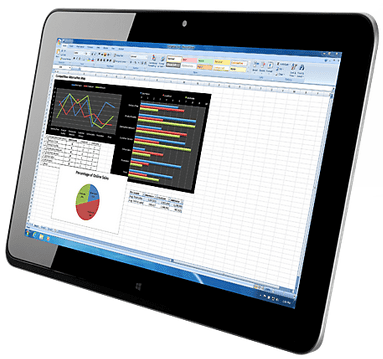Mobility Beyond the Hype
While the idea of mobility in business may have started with BYOD, it has definitely expanded from there. Today it’s not only about letting employees access their email from their personal smartphone, it’s more about “equipping” your mobile workforce with the devices and applications they need to be fully productive wherever they may be. It’s about making sure all your customers and partners have 24/7 access to the information and services to make it easier to do business with you on a daily basis. Companies today are revamping their IT models for greater mobility, and we are already seeing the effects of this shift across businesses of all types. Industries that Are Prime for a Mobile Revolution While every industry is exploring how mobile technology can improve efficiency and reduce operating expenses, some are more ready for change than others: • Healthcare. An IDC Health Insights report has forecasted that spending on mobile technology within the healthcare industry is set to reach $5.4 billion by 2016. Mobile technology is already prevalent and expanding. Many patients in hospitals and medical facilities are already accustomed to checking in and providing information digitally with stationary tablet systems. Healthcare workers can use mobile devices to quickly record vitals, order medication, log patient notes and perform many other tasks as they strive to be more efficient.
- Oil and Gas. Maintenance workers and surveyors are beginning to use tablets and other devices to remotely monitor machinery and pipelines on-site to prevent equipment failures and ensure workplace safety. Mobile technology also unlocks entirely new ways to improve the oil and gas industry, such as capturing data in the field, improved mobile real-time analysis and geolocation.
- Mobile Banking. Every day, people use mobile devices to process online payments, stock trades, loans, and checks. The banking world no longer considers mobile banking to be an emerging channel; it’s become an established and vital channel. A 2013 Citrix study discovered that there was a 40% increase in mobile banking from the year prior, and that trend is expected to continue.
- Brick and Mortar. Whether your company specializes in insurance, cosmetics, food or entertainment, all types of businesses with physical locations can benefit from mobile technology. Consider the benefits of letting consumers purchase glasses from a salesperson armed with a tablet or letting them show their “smartphone coupons” for a discount. Insurance agents can use mobile apps to help customers fill out their claims forms and businesses of all types can turn their tablets into Point of Sale systems. This is only the beginning – retailers today are radically reshaping their businesses with mobile technology.
Securing Mobility to Boost Adoption Mobile devices have become embedded in our daily lives, and smart companies are using this fact to their advantage. Naturally, security is a top concern in any mobility initiative. Outfitting employee devices with hardware and software solutions that address the vulnerabilities inherent in mobile computing is the first step. This includes integrating BIOS-enabled security measures for stronger, independent pre-boot authentication as well as advanced data protection options for locking the system when unauthorized access attempts are made. If the device is being used for access to highly sensitive information, consider adding biometric authentication, such as fingerprint or facial recognition technology. After all, securing user devices is a critical requirement to providing greater mobile access to the key applications and services that everyone needs to be more productive. Start your mobile transformation today. As an HP Platinum Partner, Netsync can design, build, manage and secure your efforts with leading products such as the HP EliteBook. For more information, read Visit our Wireless & Mobility page to learn more about our HP solutions. 